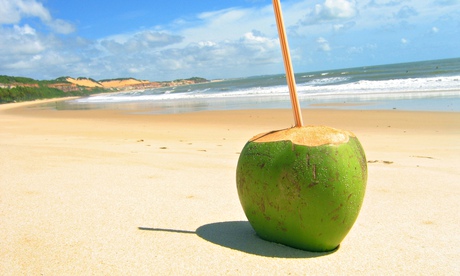Coconut water: how its popularity has affected the supply chain
Once seen as a useless byproduct, coconut water is rapidly rising to prominence. What impact is it having on coconut farmers?

Once the drink of exotic holidays and childhood funfairs, coconut water is now the de rigueur beverage available in food emporia, bodegas and hotel minibars from New Delhi to New York. Indeed, in North America – the biggest global market for coconut water today – sales of the top three most popular brands went from almost zero in 2004 to nearly $400m by 2013.
Coconut water’s rise to prominence has been rapid, with market research firm Mintel labelling it ‘the surprise toast of the beverage industry in recent years’after international launches of coconut water products quintupled in the five years to 2013. But where has this left the key ingredient in this equation – coconut farmers?
The blunt answer: with very little. Traditionally, coconuts were harvested for their meat, or ‘copra’, from which coconut oil is extracted. Fresh coconut water is quick to begin decomposing once the coconut is cut, so with little ability to preserve it, the water was often discarded as an unmarketable by-product. Then along came processing and packaging techniques that extended the water’s shelf life for several months, making it possible to transport it from producing countries such as Brazil, Indonesia and the Philippines, to wealthier markets such as the US, western Europe and Australia. Coconut water’s makeover had begun, and the craze continues apace.
Yet far from lifting coconut farmers out of poverty, we’re left in a situation whereby farmers receive about $0.12 - $0.25 per coconut and earn anything between $72 - $7,000 a year, according to Fair Trade USA. In contrast, the average serving of coconut water sells for $1.50 in the US, or £1.85 in a UK supermarket for a 330ml carton. To put this into context, a farmer earning the lowest bracket of $72 could afford just 48 cartons of 330ml coconut water if they bought nothing else that year.
Unfortunately, there’s nothing new about the appalling gap between what farmers earn at one end of the supply chain, and food and beverage companies’ profits at the other. Left at the mercy of market demand and those more powerful than them in the negotiating process, farmers plant crops that may take several years to mature in the hope that the market price for those crops down the line made the investment worthwhile – or, as coconut farmer Tomy Mathew of Kerala, South India, put it to me, “worth the cost of climbing the coconut tree to pluck the nuts”. The key question in the case of coconut water is whether farmers are benefiting from the conversion of a waste by-product into a highly profitable beverage.
Despite the proliferation of information on the health benefits of coconut water, and academic research looking into coconut oil and copra, to date very little has been done to map out the impacts of the rise in demand for coconut water. Indications are, however, that processing water which was once disposed of enables those along the supply chain to create value from something that previously had none, without passing on much (if any) of that onto smallholders. Nora Pittenger, Business Development Senior Manager atFair Trade USA, points out in an interview that one of the main problems growers face is lack of information about the prices their products can fetch once processed.
Samosir, Foale and Adkins likewise presented a conference paper in which they argued that while it is widely acknowledged that coconut farmers should turn their attention to the production of more diverse products with higher economic return such as coconut water, these farmers ‘have limited knowledge of such products and access to the technology that can produce the products. They also lack access to the markets where such products can be sold’ (pdf).
In an attempt to help boost the commercialisation of coconut water and help smallholders gain market share, the UN Food and Agricultural Organisationhas since promoted good practice for the small-scale production of bottled coconut water (pdf), but farmers’ continuing vulnerability is summed up by a2013 report (pdf) from the International Fund for Agricultural Development about Indonesia, where coconut production is key to the national economy: ‘Millions of smallholder farmers, farm workers and fishers are materially and financially unable to tap into the opportunities offered by years of economic growth. They are often geographically isolated and lack access to agricultural extension services, markets and financial services.’
So it is that the stark gap between the two ends of the coconut water supply chain is only growing further apart. While Vita Coco’s UK CEO Giles Brookpredicts that coconut water will be a £100m UK retail category by the end of this year for example, 60% of coconut farmers in the Philippines – one of the key coconut producing economies – still live in poverty.
What’s more, since coconut water’s marketing centres around wholesomeness, and its popularity has grown in line with the rise in health consciousness and a backlash against sugar-laden drinks, it might come as a surprise to some to learn that Coca-Cola now owns coconut water brand ZICO and PepsiCo fully acquired O.N.E. Coconut Water in 2012.
Commenting on this purchase, Massimo d’Amore, CEO of PepsiCo Beverages Americas, stated that ‘coconut water is one of the fastest growing categories in the US beverage market and one in which we see a great deal of potential. Our investment in O.N.E. is an investment in the future’
The future of the company books perhaps. As for the farmers, the jury’s still out.

No comments:
Post a Comment